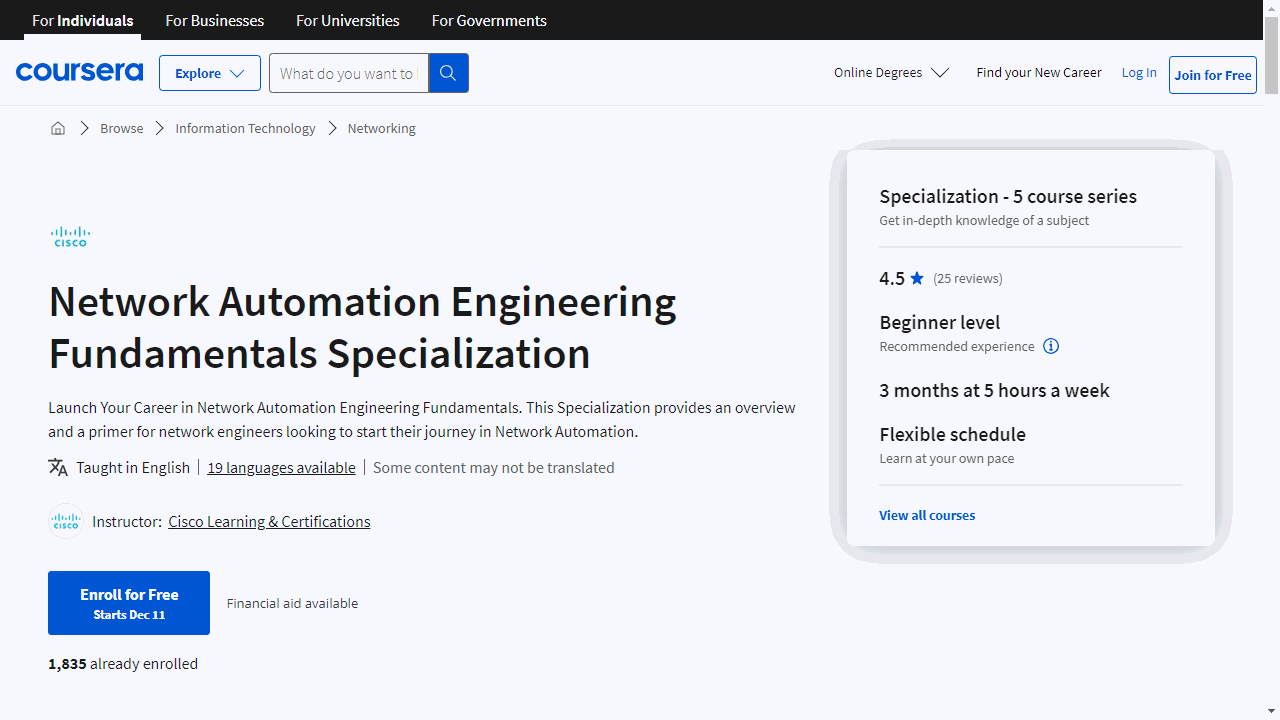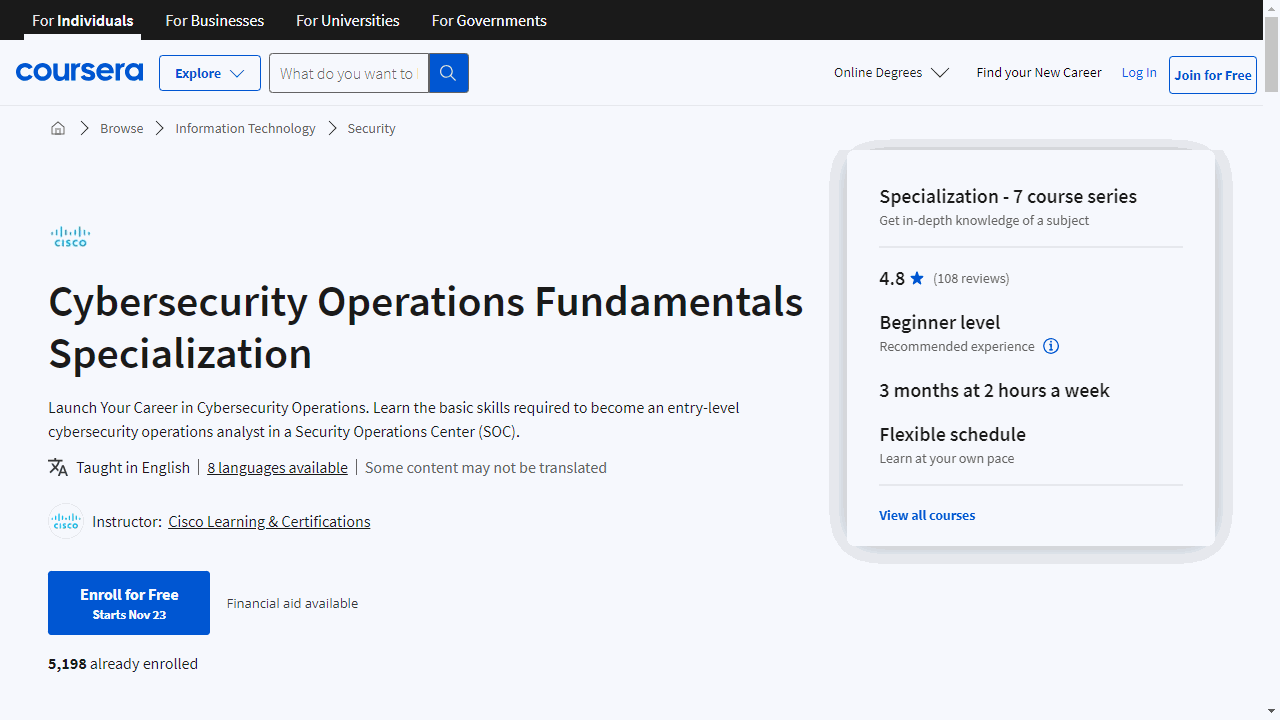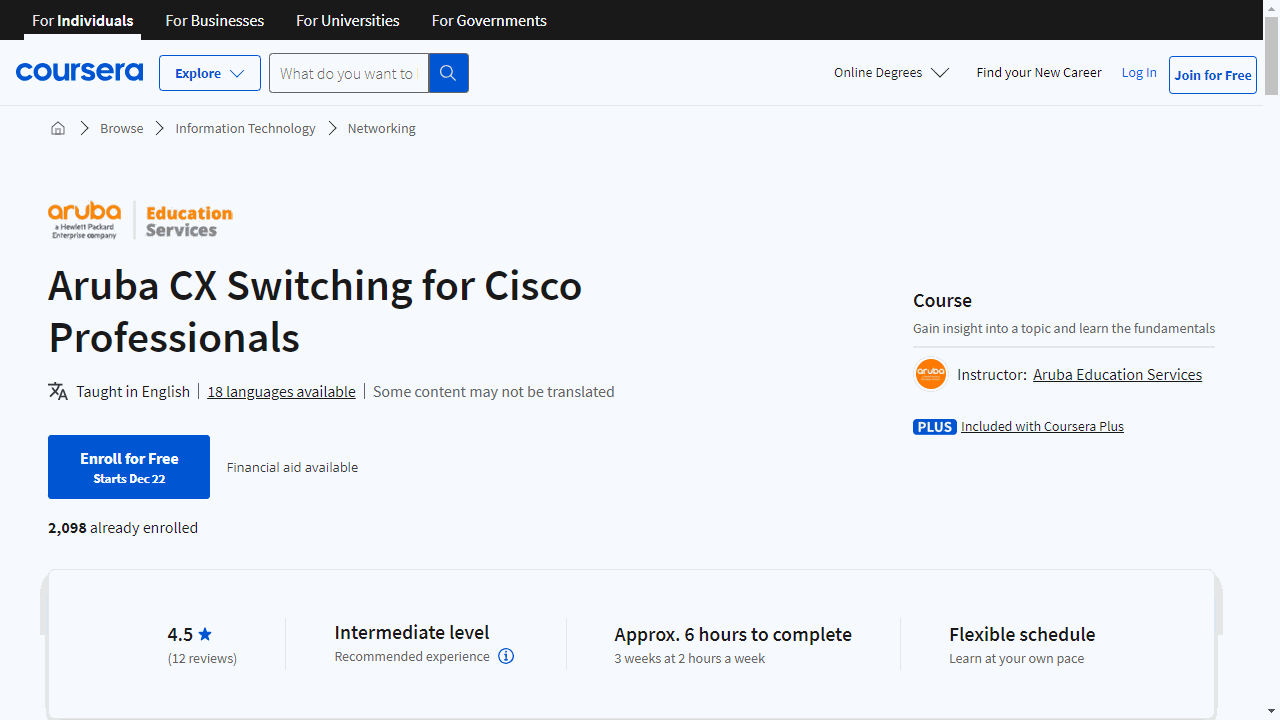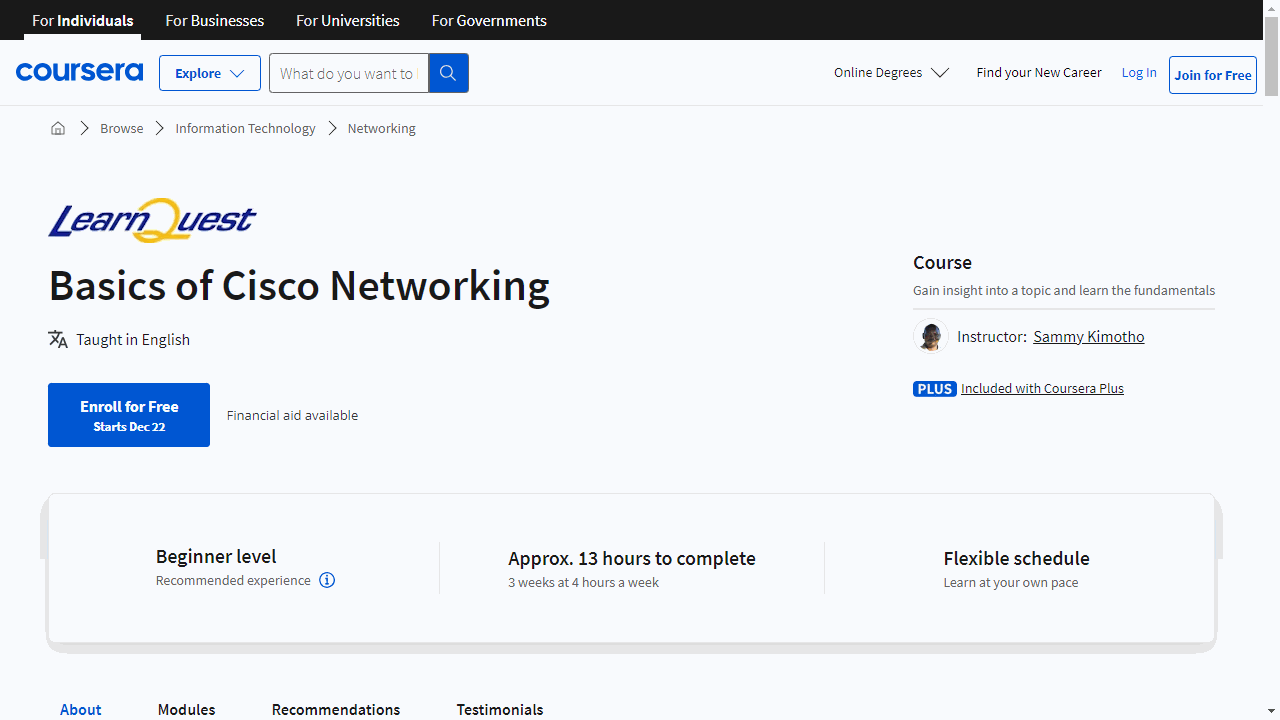Learning how to manage, automate, and secure a network is a plus for anyone working in IT.
The Cisco Networking Academy is a popular option, but you might be looking for something a little more structured, and that’s where Coursera comes in.
Cisco offers several courses through its partnership with Coursera.
We’ve carefully reviewed all the Cisco courses available on Coursera to give you our top recommendations.
For the best overall Cisco course, we recommend the Basics of Cisco Networking.
This course is perfect for beginners and offers a comprehensive overview of networking fundamentals, including the basics of network architecture, IP addressing, routing, and switching.
It’s highly rated for its clear explanations, engaging content, and real-world application examples.
That’s just the start.
If you’re looking for something more specific, whether you’re an experienced network engineer or just starting your career, we have the right course for you.
Keep reading to explore our in-depth recommendations for different levels, career paths, and Cisco technologies.
Network Automation Engineering Fundamentals Specialization
Provider: Cisco Learning and Certifications
This set of courses is designed to empower network professionals with the automation skills needed to excel in today’s network industry.
It’s preferrable if you have a CCNA certification or equivalent knowledge.
Kick off with “Introduction to Network Automation,” where you’ll understand the crucial role of automation in network management.
You’ll interpret Python scripts tailored for network tasks, setting the stage for more advanced learning.
Make sure you’re up to speed with network routing, switching, and have some Python and Linux background.
Move on to “Using APIs for Network Automation,” where APIs take center stage.
You’ll decode data formats, craft API calls, and automate network devices using Python.
This course is a fit if you’re already versed in networking basics and Python scripting.
Dive deeper with “Ansible for Network Automation.”
Here, you’ll master Ansible, an essential tool for simplifying network management, and Jinja2 for creating flexible automation tasks.
By the end, you’ll be creating Ansible playbooks and Jinja2 templates to manage networks efficiently.
In “DevOps for Network Automation (NetDevOps),” you’ll explore DevOps tools and methodologies that enhance network operations.
You’ll differentiate between software development methods and apply DevOps principles to network tasks, paving the way for more streamlined operations.
Finally, “Introducing Model-Driven Programmability” will familiarize you with YANG data models and the standardized approach they provide for network device interactions.
You’ll delve into NETCONF, RESTCONF, and Python libraries that interface with these technologies, rounding out your network automation expertise.
Each course builds upon your knowledge of network fundamentals and Python, preparing you to automate network operations effectively.
Cybersecurity Operations Fundamentals Specialization
Provider: Cisco Learning and Certifications
This specialization is designed to build a solid foundation in cybersecurity operations, making it ideal for associate-level analysts working in security operation centers.
The “Security Operations Center (SOC)” course is your entry point, focusing on the roles and responsibilities within a SOC.
You’ll learn about the adversaries, their tactics, and the strategic importance of SOCs in defending against cyber threats.
For those with a technical background, including knowledge of Cisco solutions, networking, and operating systems, “Endpoints and Systems” offers a deep dive into the intricacies of Windows, Linux, and Mac OS.
You’ll explore system architecture, processes, and administrative tasks, gaining practical skills for managing and securing endpoints.
In “Network Security,” the course shifts to the critical infrastructure of networks, introducing you to security monitoring tools and concepts like Access Control Lists and Network Address Translation.
This knowledge is vital for safeguarding the pathways through which data travels.
“Data Security” hones in on the types of data crucial for network security analytics.
You’ll become proficient in using SIEMs, understanding the Security Onion tool, and handling packet capture data, which is essential for incident investigation.
“Threat Analysis” teaches you to dissect cyber-attacks using models like the kill chain and diamond model.
This course empowers you to analyze and counteract threats effectively, enhancing your ability to protect your organization.
“Threat Investigation” elevates your skills in proactive threat hunting.
You’ll learn about the Common Vulnerability Scoring System and utilize threat intelligence to anticipate and neutralize emerging threats.
Finally, “Threat Response” rounds out the specialization by focusing on incident response.
You’ll learn to develop response plans, categorize incidents, and understand compliance regulations, ensuring you’re prepared to act decisively during security incidents.
Aruba CX Switching for Cisco Professionals
Provider: HPE Aruba Networking
If you’re already skilled in Cisco systems and looking to broaden your expertise, this course is for you.
Offered by HPE Aruba Networking, is a practical step into Aruba’s innovative networking technology.
You’ll start with an overview of the Aruba Solution and Switching Portfolio, gaining insight into the range of Aruba’s networking products.
This foundational knowledge sets the stage for more advanced learning.
Understanding stacking is crucial for network efficiency, and you’ll explore various stacking methods.
This knowledge enables you to optimize and scale network performance effectively.
Security is paramount in networking, and the course doesn’t skimp on this.
You’ll learn strategies for secure management and maintenance to safeguard your network infrastructure.
The hands-on aspect of the course comes alive with AOS-CX Management Tools.
Using NetEdit and the Aruba CX Mobile App, you’ll practice real-world network management scenarios, which can simplify complex tasks.
For an even deeper dive, the course offers self-directed labs for purchase.
These labs provide a practical environment where you can apply what you’ve learned and hone your skills.
Basics of Cisco Networking
Provider: LearnQuest
The course begins with an easy-to-follow introduction to computer networks, where you’ll learn about the various network types and the protocols that keep them running.
You’ll quickly move on to understanding the roles of essential network devices, such as routers and switches, and the significance of network topologies.
The course makes these concepts accessible, ensuring you grasp the layout and structure of networks.
A key part of this course is the practical experience with Cisco’s IOS and the Command Line Interface (CLI).
Through a lab demonstration video, you’ll get a firsthand look at how to navigate these tools, which are crucial for any networking professional.
The OSI and TCP/IP models are the backbone of networking theory, and you’ll explore each layer in detail.
The course simplifies complex topics like IP addressing and subnetting, giving you the confidence to manage network traffic.
Hands-on learning continues as you practice configuring switches and troubleshooting routing issues.
The course provides a systematic approach to identify and solve common network problems, enhancing your problem-solving skills.
Security is a top priority in networking, and this course equips you with the knowledge to identify threats and implement security measures.
You’ll learn how to secure Cisco routers and switches and gain practical experience by configuring Layer 2 security.
Finally, the course covers network management tools and best practices, including the use of Access Control Lists (ACLs) to regulate network access.
This comprehensive coverage ensures you’re well-prepared to maintain and secure a network environment.




